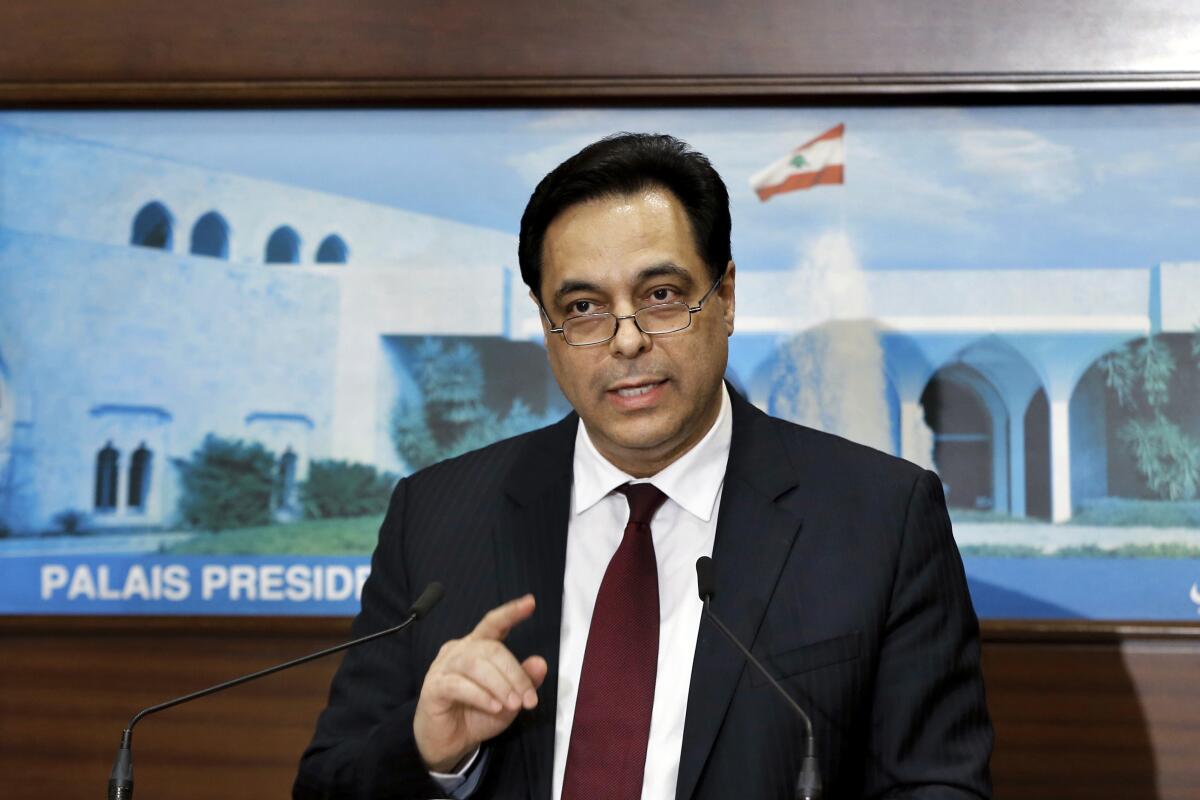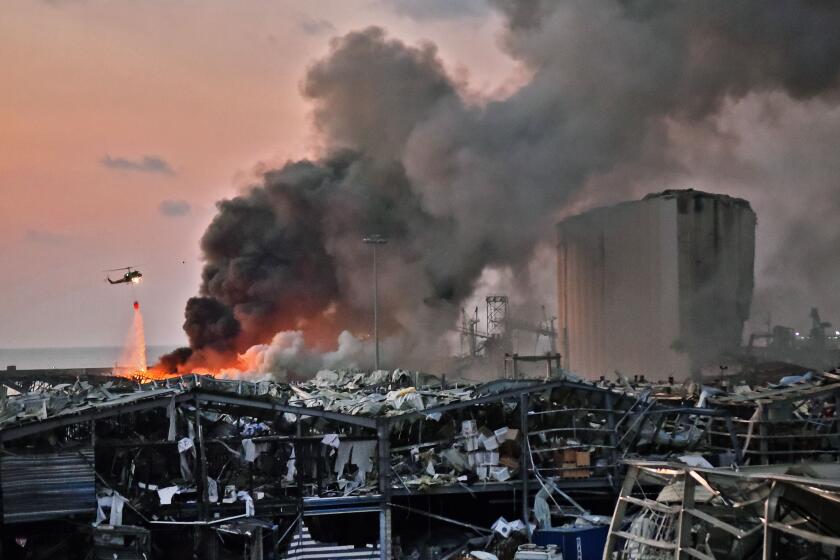Lebanon’s Cabinet resigns en masse amid public outrage over Beirut blast

- Share via
BEIRUT — Lebanon’s beleaguered prime minister and the rest of his Cabinet resigned Monday, six days after a catastrophic explosion in Beirut’s port leveled large areas of the capital.
Prime Minister Hassan Diab said he was stepping down as demonstrators squared off for a third consecutive day against security services in protests against the country’s ruling elite.
“We take a step back to stand with the people, so that we can wage the battle for change with them,” Diab, 61, said in a televised address from the government’s headquarters in downtown Beirut. “We wish to open the door before a national salvation, with the Lebanese participating in its making,”
“Therefore, I declare today the resignation of this government,” he said. “May God protect Lebanon.”
With his resignation, Diab’s government assumes a caretaker role until a new administration can be formed.
The massive blast last Tuesday, ranked as one of the world’s largest non-nuclear explosions, was caused by the detonation of more than 2,750 tons of ammonium nitrate — a chemical used as both a fertilizer and explosive — which blew up after a fire started in a nearby warehouse in the port. It resulted in a wave of destruction that ravaged entire neighborhoods, killed more than 160 people and injured 6,000 others. Hundreds are still missing.
Meanwhile, 300,000 people have been left homeless, with damage estimated at $10 billion to $15 billion. An international aid conference Sunday spearheaded by President Emmanuel Macron of France, which once controlled Lebanon as a protectorate, raised $298 million.
Diab had promised a swift investigation into the explosion, but authorities have continued to tussle over whether international parties would be involved in the proceedings. Lebanese President Michel Aoun said last week in a statement on Twitter that calls for an internationally led investigation were “a waste of time.”
Los Angeles Times reporter Nabih Bulos was less than 500 yards from the center of the massive explosion in Beirut. He lived to tell the tale
On Monday, Lebanon’s official National News Agency reported that the Cabinet had referred the investigation to the Judicial Council, Lebanon’s top court, at Aoun’s request. Authorities have so far detained 20 people and begun questioning a number of officials. Judge Ghassan Khoury has begun questioning Maj. Gen Tony Saliba, who heads Lebanon’s state security agency, the news agency said.
In his address, Diab hinted at the difficulties faced by his Cabinet, which early this year pledged reform after months of anti-government protests.
“Previously I said that the system of corruption is entrenched in all parts of the state,” he said. “But I discovered that the corruption system is larger than the state and that the state is shackled to this system and cannot get rid of it. One of the examples of corruption blew up in the port of Beirut.”
Questions about last week’s blast have centered on why the stockpile of ammonium nitrate had remained in the port for more than six years despite officials there repeatedly asking for its removal; they received no answer.
Critics say negligence is par for the course for the port, which — like many of the country’s public institutions — is beset by allegations of corruption. Others insist it’s under the de-facto control of the Iranian-backed Lebanese Shiite paramilitary group and political party Hezbollah, which Washington designates as a terrorist entity.
Hundreds of enraged Lebanese had gathered in Beirut’s downtown area by early Monday evening before Diab’s address.
Since the blast, protests that erupted last fall over the country’s floundering economy but were lately in abeyance out of coronavirus fears have resumed. In clashes markedly more violent than those last year, security forces have responded with tear gas and, according to local media reports, rubber bullets and live rounds.
Those scenes were replicated yet again Monday. Protesters scrabbled for rocks to pelt a phalanx of security forces clad in full riot gear; the forces in turn lobbed a volley of tear gas canisters at the demonstrators before withdrawing behind concrete barriers erected at the entrance of parliament.
Lebanon’s government is the result of a power-sharing arrangement among 18 fractious sects; many are headed by then-warlords in the country’s 15-year civil war. Though that war ended in 1990, many maintained their power among their constituents by doling out perks, including government jobs, even as the state failed to provide basic services such as 24-hour electricity.
Diab’s government was meant to change that, he said, but “between change and us is a very thick wall, protected by a [political] class which uses every dirty trick to preserve its interests … and its ability to control the state.”
Maha Yahya, the director of the Carnegie Middle East Center, said the government’s resignation was inevitable amid public fury after the massive blast.
“The social solidarity has been amazing, but state institutions are simply not there,” she told the BBC.
But any new government, she said, will be dogged by the same problems laid bare by the explosion: entrenched corruption, nepotism and patronage networks tied to political parties.
“This will take time, but you’ve got to start somewhere,” she said.
As the focus turns to rebuilding and recovery, U.N. Secretary-General Antonio Guterres again offered a pledge of solidarity.
“Lebanon is resilient. Lebanon has immense spirit and will,” he wrote on Twitter. “And Lebanon is not alone.”
Times staff writer Laura King in Washington contributed to this report.
More to Read
Sign up for Essential California
The most important California stories and recommendations in your inbox every morning.
You may occasionally receive promotional content from the Los Angeles Times.












